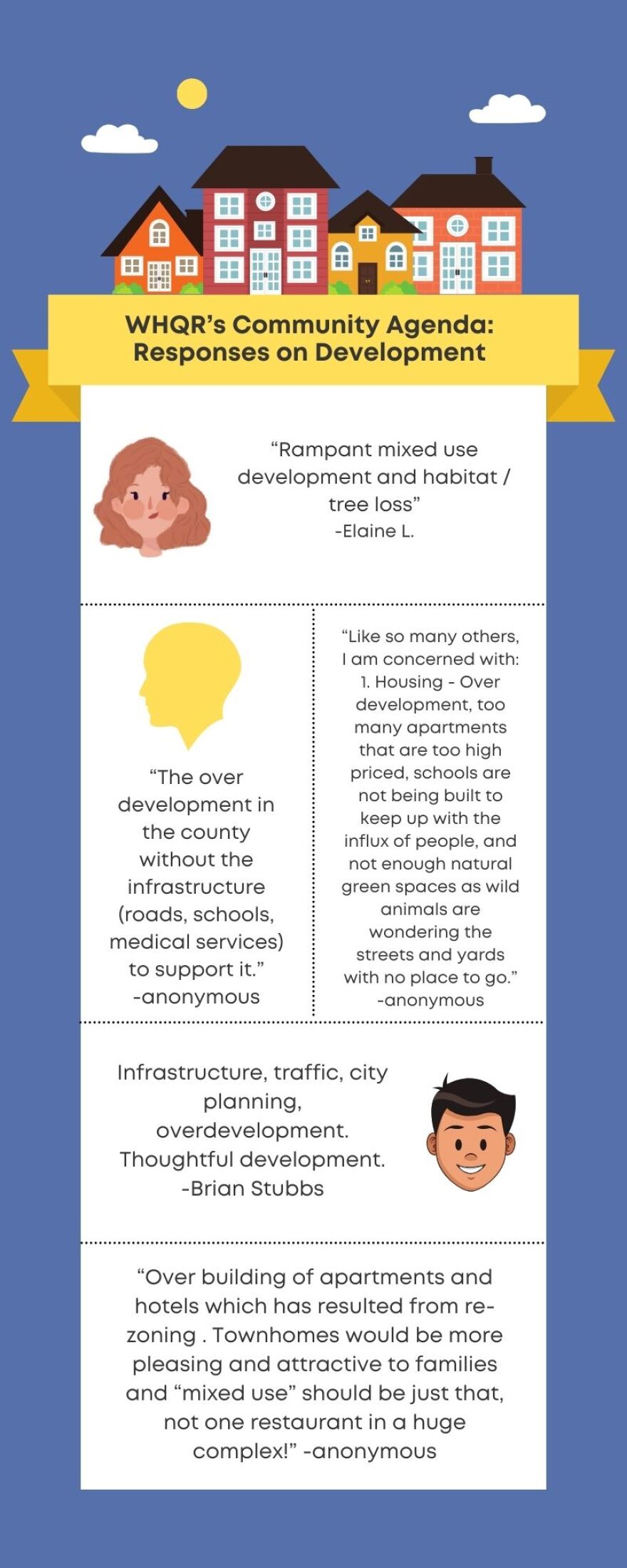Development goes hand-in-hand with several of our other top concerns from the community so far: housing, homelessness, traffic, and infrastructure.
Building developments can help with demand for housing, which helps with homelessness. But, of course, adding more development requires more or better infrastructure. And new apartments can contribute to traffic.
Respondents to the WHQR Community Agenda survey have had a wide range of views on development: when and where it should happen, and how. Some tied development to high real estate prices, housing affordability, or concerns around infrastructure or stormwater.

Here’s what we heard when we followed up and interviewed survey respondents (the survey has an 'opt in' box that residents can check if they're willing to talk more about their thoughts and concerns with a reporter):
Rob Condon, the director of a local science education nonprofit, said development has consequences: “I know for a fact that downtown Wilmington is 90% concrete, so is the Northside. And as a result of removing the trees that are there, it gets even warmer, and that creates this heat island index.”
Rob says the increase in heat means higher utility bills and discomfort for residents, and it’s especially hot in low-income communities, where there’s less tree cover and more concrete and blacktop. He wants to see development that accounts for our future with climate change, and that puts the comfort and enjoyment of residents at the forefront.
Another respondent, Sylvia Santaballa, is a downtown resident.
"From what I can see in Wilmington, I've been here for 25 years, the city and the surrounding areas are growing more and more and more," she told WHQR.
But she’s not opposed to development, even in her own neighborhood.
"I have observed that development tends to be horizontal and not vertical in Wilmington. And that means sprawl. And that means that the people who are developing the housing are interested in, from what I can observe, in profit," she said.
Sylvia wants to see vertical development in her area, because she’s worried about there not being enough affordable housing. But she knows many of her neighbors will disagree.
“Many neighborhoods in Wilmington, the inhabitants don't want people to build right next to their home. So I call that the not in my backyard or the NIMBY mount mindset," she said.
Still, she worries that developers have undue influence over city and county boards. She sees new developments as largely focused on high-income newcomers, not lower-income residents:"Sometimes people are just one paycheck away, or a job loss from being on the street. So it's a tension, I think that we need to consider. You know, it's complex. Housing is complex.”
Marie Gordon is a more recent transplant to the Wilmington area who came from Washington DC. She’s disquieted when she sees large swaths of trees clear-cut and replaced with apartment buildings. She pointed out a spot on Independence Boulevard she drove by recently.
"I see red tags around trees, yellow tags around trees," she told WHQR. "And it was like, Oh, my God, they're going to take all of that down and put up again, these, you know, not single-family homes, right?”
She worries about traffic problems because of the growth, especially with new apartment buildings: "They're not doing anything to enhance the roads around those areas that they're putting that massive amount of housing in. So you don't have the infrastructure to support it. So the traffic is only going to get worse.”
Instead of developing dense housing on virgin land, she says she wants to see vacant buildings redeveloped, "instead of clear-cutting and creating the sprawl and not supporting it with infrastructure, I know it's more expensive to develop that way. But it is smarter to develop that way.”
Those are just a few of the voices and perspectives that WHQR has heard during our survey, with development and housing being the top two concerns so far. Do you agree? Do you have other concerns? What do you want to hear from city council candidates? Let us know by responding to WHQR's Community Agenda survey.


